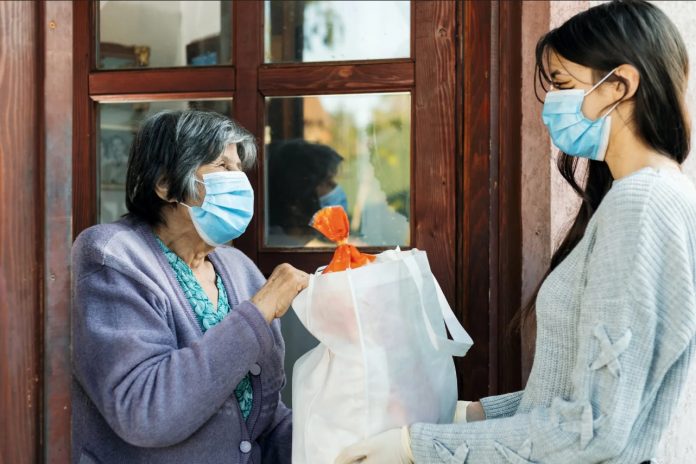For many of us, the most difficult challenge that COVID-19 presents isn’t social distancing or staying home but rather sitting on the sidelines as we watch or read about the pain and suffering that the virus is causing throughout the world. Finding a way to help healthcare workers, working parents whose children are home from school, or the elderly can help ease anxiety and give you a positive way to channel those feelings.
Research has confirmed what most of us know in our gut: Volunteering and helping others doesn’t just help the people or the cause that you’re giving your time and energy to; it can help you feel better, too. Volunteering can decrease feelings of depression, increase life satisfaction, and improve overall well-being, according to an analysis published in BMC Public Health.
Safety First When Offering Your Services
As you might have guessed, volunteering in the time of the pandemic is more complicated than in normal circumstances. Organizations not only have the logistical challenges of managing surges in the demand for some services but there’s also a need to keep everyone safe.
Even though you may feel healthy, the virus can be spread by people who aren’t showing symptoms, according to the Centers for Disease Control and Prevention. Always take the necessary precautions to keep yourself and others safe, whether you’re volunteering with an organization or helping out friends or people in your neighborhood.
But if you’re ready to roll up your sleeves (after you’ve washed your hands, of course!) and jump in, here are some ideas and tips on volunteering or helping others during the coronavirus pandemic.
Assess Your Time, Energy, Skills, and Experience
Because most organizations have limited resources and methods for training new volunteers, you’ll want to consider what skills and experience you have that would be a good fit for current needs.
Be honest with yourself about how much time and energy you have to offer before you commit to an organization or even another individual. If work or your own responsibilities will make it stressful to follow through on your assigned volunteer tasks, it’s probably best to start with taking on a little less than you think you can manage; you can always take on more once you’re sure you can do it.
And don’t give up if you don’t find something right away. As the pandemic progresses, community needs may change, and your services or skills may be just what’s needed.
How to Help and Support Seniors During the Pandemic
Our older population is especially vulnerable during this time, says Ardeshir Hashmi, MD, director of the Center for Geriatric Medicine at the Cleveland Clinic in Cleveland, Ohio. “There are many older folks who are alone at home or elderly couples who are dependent on each other without family nearby who may have trouble accessing food and services,” he says.
Seniors are also facing mental health challenges due to loneliness and isolation, says Dr. Hashmi. “This can be particularly true for those living in assisted living facilities, which are on lockdown right now. I’ve also heard that within the facilities, many individuals are confined to their rooms,” he says.
A good first point of contact is through organizations or health systems in your area. Food banks, area agencies on aging, or the National Council on Aging could all help point you to appropriate volunteer tasks.
Social media is another way to let people know you’re willing to help. If you’re able to shop and deliver groceries or run other errands, let your friends know or post on your neighborhood or community Facebook page.
Help for the elderly is essential in three areas, says Hashmi.
Delivering Groceries or Meals Good nutrition and sufficient calories are important for the body and mind, as well as for keeping spirits up. Local opportunities to deliver food to those who need it are available through the national organizations Feeding America and Meals on Wheels.
If there isn’t anything in your area, you could offer your own grocery delivery service through social media or a local news outlet, as two friends in Miami did, but make sure you have plenty of help and a solid plan before making an announcement to thousands of people!
Social Support With social distancing measures in place, a phone call may be the only way to check on elderly people who may be home alone for many weeks or even months due to the virus.
Many local churches and civic organizations are organizing to make calls to seniors to offer help or just a listening ear. Volunteers help with individual needs, such as a trip to pick up prescription medicine or track down a few rolls of toilet paper. A group of young parishioners at a Catholic church outside of Chicago created spreadsheets to make calls to nearly 800 seniors in the community; volunteers were given a script to get the conversation started.
“This is a time when everyone has increased anxiety levels, so offering reassurance is a good way to provide support,” says Hashmi.
Technology Help Offer to help your parents, grandparents, or seniors in your community stay connected through technology. Even simple things such as talking them through downloading a podcast or audiobook or writing down instructions on how to connect to the digital books or recordings at your local library can make a big difference.
It’s never too late to teach someone how to FaceTime or video conference. Written instructions or step-by-step tutorials can help even the most technologically challenged individual. You can also find online resources, such as those offered by the Philadelphia nonprofit Generations on Line, that are designed to help older people stay connected through the internet.
Supporting Healthcare and Essential Workers
Probably no one is under more stress than the people caring for individuals with the coronavirus and those deemed essential workers, who must interact with other people as they do their jobs — even while they also manage their own households and family responsibilities. Here are a couple of ways you might lighten their load:
Get crafty. If you know how to sew (or always wanted to learn), you could join the effort to make homemade masks. There are organizations, such as Masks4Medicine, that are accepting homemade fabric masks to distribute to hospitals that may not have enough N95 or surgical masks for the number of healthcare workers they have.
The organization has posted a YouTube video that provides a step-by-step guide on making the masks. Unused or expired N95 or surgical masks are accepted, too.
Help with childcare. As schools and day cares have been forced to close for now, many local groups have come together to provide childcare. Try an online search to find groups that may have started in your area, or connect through the student-led initiative Step Up to Sit, a new organization that matches high school and college students willing to babysit for individual families so that healthcare and other essential workers can do their jobs.
Keep in mind that babysitting will put students and children in close contact, so meticulous hand hygiene must be practiced by all involved, and babysitters must commit to safe physical distancing outside of the babysitting relationship.































